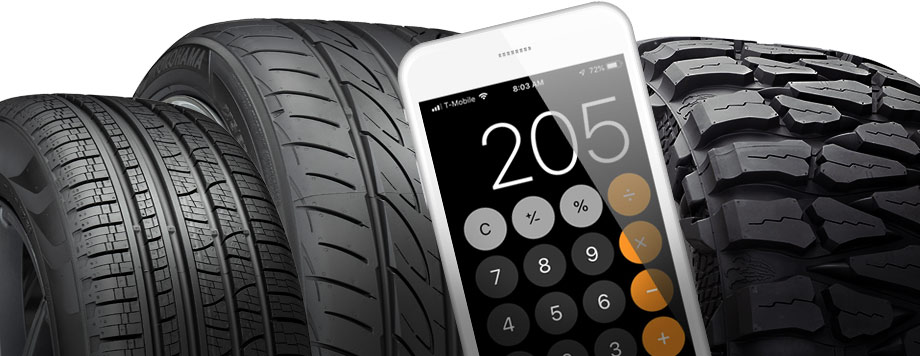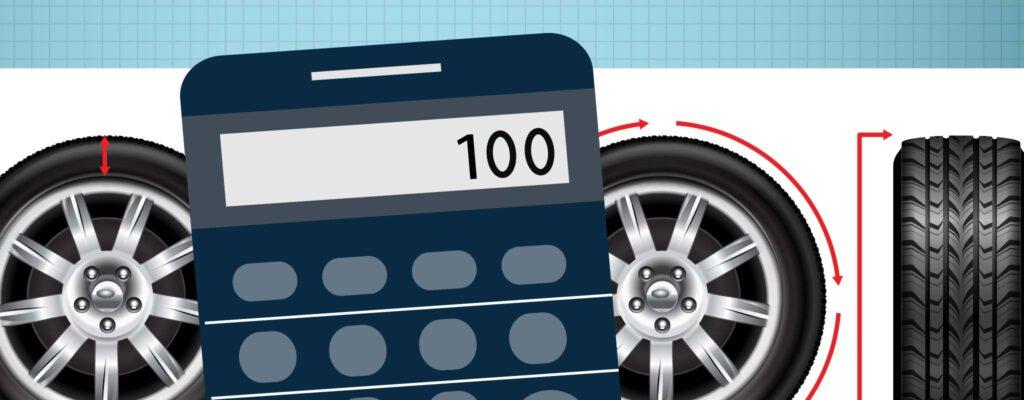The tire size calculator by vehicle helps you find the right tire size for your car. By entering the make, model, and year of your vehicle, the calculator determines the tire size that fits best.
Properly fitting tires are crucial for maintaining the safety and functionality of your vehicle. Incorrectly sized tires can lead to reduced performance, decreased fuel efficiency, and even safety hazards while driving. Therefore, using a tire size calculator to determine the correct size is crucial.
The calculator takes into account factors such as the vehicle’s weight, tire pressure, and speed rating to ensure the recommended tire size is suitable for your vehicle. With the help of a tire size calculator, you can easily find the right tires for your car without any hassle.

Credit: www.discounttire.com
Understanding Tire Size
When it comes to your vehicle, it’s crucial to understand the size of your tires. Proper tire size ensures your safety, vehicle performance, and overall comfort. The tire size is a combination of different numbers and letters that may seem confusing, but they all denote essential features.
Breakdown Of Tire Size Components
Here’s a breakdown of the tire size components, and what they represent:
- Width: The first three-digit number on the tire represents the tire’s width, measured in millimeters.
- Aspect ratio: The second number identifies the tire’s aspect ratio, which is the ratio of the tire’s height to its width.
- Diameter: The diameter is the third number and represents the tire’s size, measured in inches.
- Load index: A two or three-digit number after the size designation indicates the tire’s load carrying capacity.
- Speed rating: A letter after the load index indicates the tire’s maximum speed capability.
Tips For Interpreting And Understanding Tire Size Options
Understanding the tire size helps you decode what type of tire you may need to buy. Here are some tips to help you:
- Check your vehicle owner’s manual to learn what tire size is best for your vehicle. You can also find the tire size’s information on the sidewall of your vehicle’s tire.
- Always fit tires with the same size and specifications as recommended in the owner’s manual.
- If you need to replace one tire, it’s best to replace all four tires simultaneously.
- The tire size affects the vehicle’s speedometer, so make sure to choose the right size to avoid incorrect speed readings.
The Importance Of Selecting The Right Tire Size For Your Vehicle
Choosing the wrong tire size can affect your vehicle’s performance, handling, and even affect the safety of your vehicle. Therefore, it’s vital to select the right tire size while buying new tires.
Proper tire size ensures the following:
- Optimal handling and steering.
- Reduced risk of a tire blowout.
- Improved fuel efficiency.
- Enhanced driving comfort.
Understanding tire size is crucial to ensure that your vehicle’s performance, safety, and comfort remain uncompromised. By using the tips mentioned above, you can confidently select the right tire size for your vehicle and keep your journey comfortable and safe.
Importance Of Choosing The Right Tire Size
Your vehicle’s tires are one of the most critical parts of your ride. They’re the only part of your vehicle that comes in contact with the road, making them an essential factor in your car’s performance and safety. Choosing the right tire size for your car can improve its handling, fuel economy, and even make it look better.
Here are some reasons why selecting the correct tire size matters:
Impact Of Incorrect Tire Size On Vehicle Performance And Safety
The size of your car’s tire can significantly impact its performance and safety. Using incorrect tire size may lead to the following issues:
- Decreased performance: If you use oversized tires than the manufacturer recommendations, it can add stress on your engine, cause poor handling, and negatively impact your acceleration and braking.
- Decreased safety: Using incorrect tire size impacts your car’s safety as it can cause tire blowouts, possible tire failure, and ineffective braking.
Explanation Of How The Size Of Your Tires Can Affect Your Vehicle’S Driving Features, Such As Speedometer And Fuel Economy.
The size of your car’s tire can impact various driving features. For instance:
- Speedometer readings: Using the wrong tire size can cause issues with your speedometer reading and calibration, making it run fast or slow.
- Fuel economy: Installing oversized tires can cause lower gas mileage because the engine has to work harder to rotate the bigger tire.
Explanation Of Why Larger Tires Aren’T Always Better
Larger tires aren’t always better; there are some points to keep in mind, such as:
- Poor handling: Larger tires have less responsiveness and take longer to stop compared to smaller tires, which can lead to dangerous situations while driving.
- More expensive: Large tires are expensive to purchase and maintain. They can also add extra strain on your vehicle’s suspension and other systems, potentially increasing repair costs in the long run.
Choosing the right tire size is crucial to your vehicle’s performance and safety. Thus, be sure to check your car’s owner’s manual or the manufacturer’s recommendations before making any changes to your tires.
Using A Tire Calculator
Explanation Of Different Types Of Tire Calculators
A tire calculator is an essential tool for anyone looking to replace their vehicle’s tires. Tire calculators can come in various forms, including online calculators and manual calculations. An online tire calculator is the most common form of tire calculator available in the market.
It is a tool that helps you determine the correct tire size for your vehicle, based on your car’s make and model. On the other hand, manual calculations refer to the traditional way of calculating tire size, which involves determining the tire’s width, aspect ratio, and diameter.
Overview Of Benefits And Limitations Of Various Types Of Calculators
Choosing the right tire size is essential as it affects your vehicle’s performance and safety on the road. Online calculators are convenient and straightforward to use, allowing you to determine the correct tire size in just a few clicks. With online calculators, you get to enjoy a user-friendly interface, pre-programmed options, and helpful tips to guide you in your selection.
However, online calculators rely on accurate input data, and some may not provide all the necessary information, such as load capacity or speed rating. Therefore, it is important to double check the results manually. Manual calculations, on the other hand, take a bit more time and effort to perform.
However, it can be more accurate, allowing you to buy tires that better suit your driving needs.
Best Practices For Using A Tire Calculator To Select The Right Size And Type Of Tire For Your Vehicle
Using a tire calculator may seem like a daunting task, but it doesn’t have to be. By following some best practices, you can ensure that you select the right tire size and type for your vehicle easily.
- First, ensure that you have the correct information about your vehicle, such as its make, model, and year. This information is crucial when using an online calculator.
- When using an online calculator, input the correct tire size that is currently on your vehicle. This will help the calculator provide a better selection of tire options that are compatible with your car.
- Double-check the results manually by using the traditional manual calculation method. This will ensure that the results are consistent.
- Consider other factors such as the terrain you frequently drive on, weather conditions, and your driving style when selecting a tire type.
- Lastly, always purchase tires that match your vehicle’s load capacity and speed rating to ensure your safety on the road.
Tire calculators are essential tools for selecting the right tire size and type for your vehicle. By understanding the various types of tire calculators available, their benefits and limitations, and following best practices, you can get accurate and safe tires that will improve your vehicle’s performance and safety on the road.
Factors To Consider When Choosing A Tire
Factors That Should Influence Tire Selection
When selecting a tire for your vehicle, there are several factors that you should consider. These include:
- Driving conditions: The type of driving you do affects the type of tire you should choose. A tire that is suitable for city driving may not be suitable for off-road driving or highway driving.
- Vehicle type: The type of vehicle you have will also affect the type of tire you should choose. For instance, a sports car may require performance tires, while an suv will require tires designed for off-road driving.
- Climate: The climate in your region should also be taken into consideration. If you live in an area with heavy snowfall, you should consider winter tires.
- Budget: Your budget will also play a role in the tire you choose. High-performance tires can be expensive, but they’ll provide improved handling and performance.
Guide To Different Types Of Tires Available
There are several types of tires available, each designed to provide optimal performance under a particular set of conditions. These include:
- All-season tires: These tires are suitable for use year-round, providing good traction in both dry and wet conditions.
- Winter tires: Designed for use in snow and ice, winter tires have a unique tread pattern that provides superior traction in slippery conditions.
- Summer tires: These tires are optimized for use in warm weather, providing improved handling and grip on dry roads.
- Performance tires: Designed for sports cars and other high-performance vehicles, these tires provide superior handling and increased speed capabilities.
Understanding Tire Categories
Tires are categorized based on their design and intended use. The labeling on a tire often includes information about its size, load capacity, and speed rating, as well as its wet traction, dry traction, and tread wear ratings. Here’s what each category means:
- P: Passenger car tire
- Lt: Light truck tire
- T: Temporary spare tire
- St: Trailer tire
- C: Commercial tire
- M+s: Mud and snow tire
- Owl: Outlined white lettering
- Bsw: Black sidewall
Understanding these tire categories can help you choose the right tire for your vehicle and driving needs.
Frequently Asked Questions For Tire Size Calculator By Vehicle
What Is A Tire Size Calculator?
A tire size calculator determines the effects of changing your tire size on the speedometer’s accuracy. You can calculate the new tire size using this tool.
How Do I Use A Tire Size Calculator?
To use a tire size calculator, enter your vehicle’s make, model, trim, and year. Select your current tire size and then the size you want to compare.
Why Is It Important To Use A Tire Size Calculator?
Using a tire size calculator ensures that the new tire size doesn’t negatively impact your vehicle’s speedometer accuracy. A tire size calculator helps you keep your driving safe and accurate.
Can Using The Wrong Tire Size Affect My Vehicle?
Yes, using the wrong tire size can affect your vehicle’s handling, acceleration, and braking techniques. Using the wrong tire size may lead to danger while driving and also lead to damage the car.
Is A Tire Size Calculator Only For Those Who Change Tire Sizes?
No, a tire size calculator is also helpful if you want to compare different tire sizes on the same vehicle. It helps to choose the best tire for your driving preferences and car.
Where Can I Find A Tire Size Calculator?
Several websites offer tire size calculators. You can find it on top tire brand websites, wheels manufacturers’ websites, and major automobile websites.
Conclusion
After exploring the various aspects of the tire size calculator by vehicle, it’s clear that it’s an incredibly useful tool. By using it, you can get accurate measurements of different tire metrics, including size, circumference, rpm, and speedometer variance. This helps to ensure that the tires on your vehicle are properly sized and aligned, providing optimal performance and safety.
By using the tire size calculator, you can make informed decisions about the tires you choose for your vehicle, and ensure that they are a good fit for your needs. Overall, the tire size calculator is an indispensable tool for anyone looking to optimize the performance of their vehicle through proper tire selection.
So why wait? Try it out for yourself today and experience the benefits of this handy tool firsthand!

